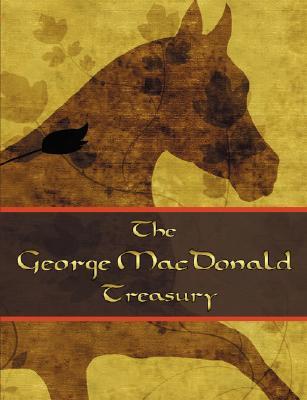The George MacDonald Treasury
by George MacDonald
s/t: : Princess and the Goblin, Princess and Curdie, Light Princess, Phantastes, Giant's Heart, At the Back of the North Wind, Golden Key, and Lilith
This enchanted collection brings together eight of George McDonald's most well known fantasies into one delightful volume. The George McDonald Treasury includes The Princess and the Goblin, The Princess and Curdie, The Light Princess, Phantastes, The Giant's Heart, At the Back of the North Wind, The Golden Key, and Lilith. MacDonald's classic works have inspired deep admiration in such notables as J. R. R. Tolkien, C. S. Lewis, G. K. Chesterton, Elizabeth Yates, and Lewis Carroll. C. S. Lewis wrote, "I have never concealed the fact that I regarded him as my master; indeed I fancy I have never written a book in which I did not quote from him." One day while in a train station, he picked up a copy of Phantastes and began to read. "A few hours later," said Lewis, "I knew I had crossed a great frontier." G. K. Chesterton cited The Princess and the Goblin as a book that had "made a difference to my whole existence." Madeleine L'Engle wrote, "Surely George MacDonald is the grandfather of us all-all of us who struggle to come to terms with truth through imagination." If you loved J. R. R. Tolkien's Hobbit and Lord of the Rings, you will love the works of his hero and model - George McDonald.
This enchanted collection brings together eight of George McDonald's most well known fantasies into one delightful volume. The George McDonald Treasury includes The Princess and the Goblin, The Princess and Curdie, The Light Princess, Phantastes, The Giant's Heart, At the Back of the North Wind, The Golden Key, and Lilith. MacDonald's classic works have inspired deep admiration in such notables as J. R. R. Tolkien, C. S. Lewis, G. K. Chesterton, Elizabeth Yates, and Lewis Carroll. C. S. Lewis wrote, "I have never concealed the fact that I regarded him as my master; indeed I fancy I have never written a book in which I did not quote from him." One day while in a train station, he picked up a copy of Phantastes and began to read. "A few hours later," said Lewis, "I knew I had crossed a great frontier." G. K. Chesterton cited The Princess and the Goblin as a book that had "made a difference to my whole existence." Madeleine L'Engle wrote, "Surely George MacDonald is the grandfather of us all-all of us who struggle to come to terms with truth through imagination." If you loved J. R. R. Tolkien's Hobbit and Lord of the Rings, you will love the works of his hero and model - George McDonald.
BUY NOW
Paperback, 668 pages
Published February 22nd 2007 by Kahley House Publishing
© 2026 Bibleportal.com 版权所有.

George MacDonald was a Scottish author, poet, and Christian minister.
Known particularly for his poignant fairy tales and fantasy novels, George MacDonald inspired many authors, such as W. H. Auden, J. R. R. Tolkien, C. S. Lewis, E. Nesbit and Madeleine L'Engle. G. K. Chesterton cited The Princess and the Goblin as a book that had "made a difference to my whole existence."
Even Mark Twain, who initially disliked MacDonald, became friends with him, and there is some evidence that Twain was influenced by MacDonald.
MacDonald grew up influenced by his Congregational Church, with an atmosphere of Calvinism. But MacDonald never felt comfortable with some aspects of Calvinist doctrine; indeed, legend has it that when the doctrine of predestination was first explained to him, he burst into tears (although assured that he was one of the elect). Later novels, such as Robert Falconer and Lilith, show a distaste for the idea that God's electing love is limited to some and denied to others.
... Show more